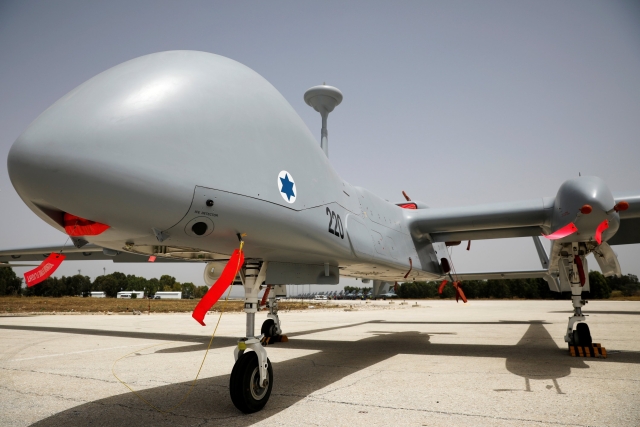A few hours after a battle in Jenin in which the IDF killed 4 armed terrorists, the Chief of Staff, Major General Aviv Kochavi, decided to authorize targeted countermeasures in Judea and Samaria, in the event that there is an operational need. This is the first time such an order has been applied to the West Bank and includes the use of armed drones for targeted strikes, something that until now, has been limited to Gaza, Syria, and Hezbollah forces in Lebanon.
Alongside this, the security forces are preparing for the expansion of security activity due to severe threats regarding terrorist squads that are preparing to carry out additional attacks in the immediate future.
After the Israel Defense Force and border patrol officers killed the 4 terrorists including Abed Fathi Hazem, the brother of the terrorist Ra'ad Hazem who executed the attack on Tel Aviv's Dizengoff street, the footage from the soldiers' helmet-cams began to leak. The footage illustrated how severe the terrorists' escalation in the West Bank really is. While the IDF soldiers managed to eliminate the terrorists, there are still squads roaming the area and, according to their own social media posts, are preparing to carry out attacks in the near future.
Video shows Palestinian Arab terrorist shot dead by Israeli sniper just as he attempts to open fire at IDF forces making arrests. pic.twitter.com/J1GSjpG0JH
— Eretz Israel (@EretzIsrael) September 28, 2022
Israel's internal security agency, commonly known as 'The Shin Bet', received information an attack was imminent. Security forces then 'raced against time' to reach the terror squads before they succeed in carrying out attacks. Amid the ongoing Jewish holiday season, it was decided to expand the operational activity against terrorism in order to address the growing threat coming from the northern Samarian towns of Jenin and Nablus.
In a meeting Kochavi held Wednesday night at the Central Command, it was decided by the security chiefs to green-light the implementation of 'targeted countermeasures with air strikes using drones in the Shomron (Samarian area of the 'West Bank'). In some units, training and courses were stopped in order to divert forces to the target areas, and in some areas, they began to mobilize reserve forces.
DRONE FOOTAGE: This is the moment 2 Palestinian suspects involved in recent shooting attacks detonated a bomb as Israeli security forces operated to apprehend them in Jenin this morning. pic.twitter.com/nYqmOgbwHx
— Israel Defense Forces (@IDF) September 28, 2022
At the same time, the political elite is not enthusiastic about the expansion of the operation and there is currently a consensus on not doing so. This is typical as elections are in a month's time and any change in how the country manages security concerns can tilt the balance of power easily as the sides are still deadlocked according to most polls.
In consultations held by Defense Minister Benny Gantz with Prime Minister Lapid, the same explanation was heard over and over - 'the border is practically closed, and monitoring through intelligence has been ramped up'. A security source in the political realm raised the concern that the entry of forces with a permanent presence in the West Bank would inflame the area and lead to an escalation.
IDF approves use of armed drones to attack terrorists in Judea, Samaria | World Israel News https://t.co/5lBWhoo6tX
— Carol (@Carol38553) September 29, 2022
In the meantime, the security establishment is worried about East Jerusalem where Hamas is trying to incite their base, hoping to literally and figuratively set the area on fire. In recent nights, clashes and violence of an unusual scale have been recorded in East Jerusalem. The result of an incitement campaign that has been gaining momentum in recent weeks by Hamas - which is trying to bring the Temple Mount back into focus with fabricated propaganda according to which Israel wants to rebuild the Temple.
Hamas' efforts in Jerusalem coincide with a two-week period where Jews gather at the Western Wall Plaza, the second holiest site in Judaism next to the Temple Mount on top of the wall, for 'Selichot' prayers. The gatherings have, as they do each year, attracted tens of thousands of Jews at midnight, in a site that many Islamic radicals consider to be a direct threat to the Al Aqsa compound, which is controlled by the Jordanian Waqf and sits atop the Western Wall adjacent to the site of the ruins of the Second Temple which was destroyed by the Romans in 70AD.
One day this will sit where it rightfully belongs, on top of the Temple Mount. pic.twitter.com/0HedMf1OXq
— Jay Engelmayer | #JusticeforMalkiRoth (@jengelmayer) September 30, 2022
Following the intense fighting in Jenin, the spokesman for the US State Department, Ned Price, expressed his fear of a possible escalation: "The US is deeply concerned about the deteriorating security situation in the West Bank. We call on all parties to do everything in their power to calm the situation." The administration of Joe Biden has been vocal in telling Israel what to do, however many questions whether Biden has considered Israel's security as many requests have been to placate Iran and Hamas, two entities that have sworn to destroy Israel, Biden's capitulation is largely seen as a way to keep the status quo and prolong the quiet, even at the expense of Israeli civilians living in Judea and Samaria.


